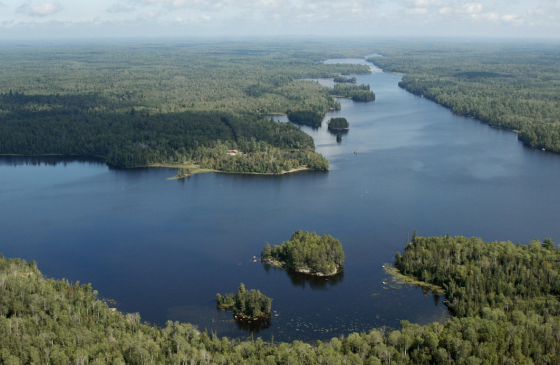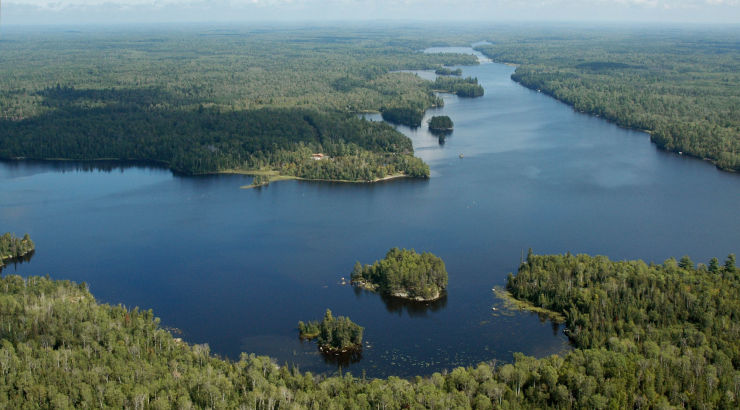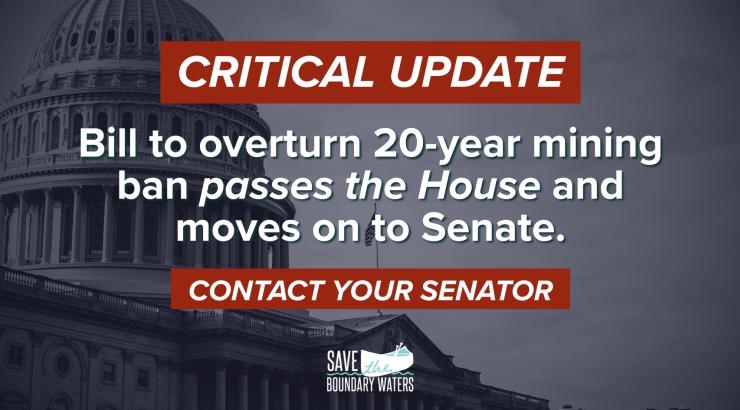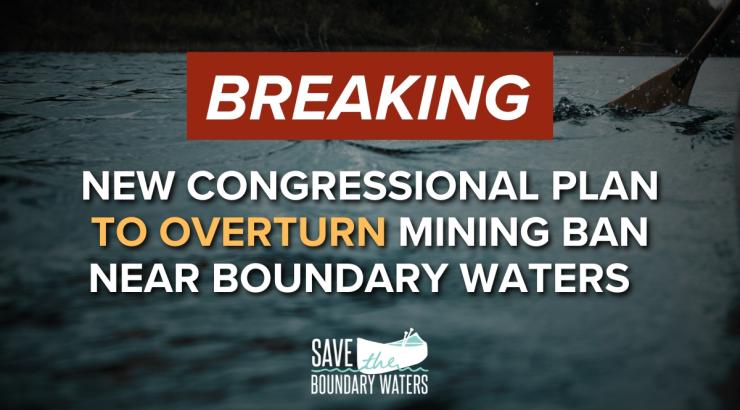In late September, Antofagasta/Twin Metals subsidiary Franconia Minerals submitted to the Minnesota DNR an application for exploratory drilling on state mineral leases covering part of the so-called “Birch Lake deposit,” south of the initial Twin Metals’ mine plan location, which was rejected in December 2021. Franconia’s exploratory drilling plan shows Antofagasta and its subsidiaries shifting their attention to propose a different sulfide-ore copper mine, still within the watershed of the Boundary Waters, directly beneath Birch Lake. Birch Lake is one of the most popular recreational lakes outside of the Boundary Waters, and one that flows directly into the wilderness.
Northeastern Minnesotans for Wilderness (NMW) urged the DNR not to approve this plan, but nevertheless, it was approved by the MN DNR on October 30, 2023. This dangerous drilling plan is a flashing reminder to all Minnesota state legislators that permanent protection of the Boundary Waters and its watershed from sulfide-ore copper mining must include passage of the Boundary Waters Permanent Protection Bill (S.F. 167/H.F. 329). The 2024 Legislature must get beyond inter-party battles to pass permanent protection for the Boundary Waters watershed permanently.
Help us push back. We need to advocate for permanent legislative protections and prepare for our crucial legal battle next year - you can help us move these measures forward by donating today.
Read more about this decision below.
On September 22, Franconia Minerals, a wholly-owned subsidiary of Twin Metals Minnesota, submitted an exploratory drilling plan to the Minnesota Department of Natural Resources (DNR). The proposal includes eight drill sites six on state mineral leases. Several of the drill pads are shown to be located on the shores of Birch Lake, with others along an unnamed creek that runs into the lake.
Birch Lake is one of the most popular recreational lakes in the Superior National Forest outside of the Boundary Waters Canoe Area Wilderness (Boundary Waters), with dozens of homes, many businesses and camps, and a number of federal campsites. It is also a wild rice lake.
Twin Metals seeks to conduct exploratory drilling in this area to advance the development of a sulfide-ore copper mine directly underneath Birch Lake.
In response to this dangerous proposal, NMW submitted a letter of objection to the commissioners of the DNR and the Minnesota Pollution Control Agency (MPCA), arguing that this exploratory drilling proposal should not be approved. Here’s why:
1. There’s an ongoing lawsuit
Copper mining in this very same area is currently the subject of pending litigation against the DNR, which should not be short-circuited.
In June of 2020, Northeastern Minnesotans for Wilderness, which leads the Campaign to Save the Boundary Waters, sued the DNR under the Minnesota Environmental Rights Act (MERA), arguing that Minnesota’s rules on where one can conduct hardrock mining (not taconite or iron-ore mining) are insufficient to protect the Boundary Waters from the harmful effects of noise, light, air, and water pollution.
As a part of this process, the DNR released Findings of Fact, Conclusions of Law, and Order on May 31, 2023, in which it determined that Minnesota’s regulations on noise and light were indeed inadequate to protect the Boundary Waters from mining activities in the Rainy River-Headwaters watershed and ordered rulemaking to expand the State’s Mineral Management Corridor within which mining-related surface disturbance is prohibited. That process is ongoing.
By demanding that DNR approve exploratory drilling in the watershed before the MERA action and related administrative proceedings have concluded, Twin Metals is essentially requiring DNR to preempt the ongoing lawsuit, short-circuiting DNR’s analysis on noise and light pollution, as well as our intent to introduce evidence at the upcoming contested case proceedings on the egregious water quality issues sulfide-ore copper mining poses in the Boundary Waters.
2. Light and Noise Pollution
Twin Metals’ exploratory drilling will cause the very same types of pollution that the DNR determined Minnesota’s rules do not sufficiently address and require amendment: light and noise pollution
The exploratory drilling now proposed, if permitted, would create distinctive and persistent noise, some of which would be audible more than 14 miles away, polluting, impairing, and destroying a key characteristic of the Boundary Waters.
In 2020, acoustic ecologist Gorgon Hempton identified the Boundary Waters as one of fewer than ten places left in the United States where visitors can escape from the constant noises of civilization for more than 15 minutes.
The exploratory drilling would also damage special features on and around Birch Lake. These include two federal campgrounds on the shore of Birch Lake and the South Kawishiwi River, Camp Northern Lights YMCA camp, Voyageur Outward Bound School (VOBS) on the South Kawishiwi River, and a set of at least 14 dispersed backcountry water-access campsites on the shores of Birch Lake and the South Kawishiwi River.
Exploratory drilling can and often does continue 24 hours a day for months and seasons on end, a ceaseless attack on the natural soundscape and the hearing and quality of life for all within earshot. This exploratory drilling plan is slated to begin in 2023 and continue until March of 2025.
In addition to noise pollution, drill pads would cause light pollution. Drilling around the clock necessitates industrial lighting equipment at the Franconia drill pads, half of which would be on or adjacent to the Birch Lake shoreline.
3. Further Water Pollution
This exploratory drilling will also contribute to already unacceptably high levels of sulfate and mercury present in Birch Lake.
Allowing Twin Metals’ exploration plan to proceed would likely result in water pollution of Birch Lake and water flowing to Birch Lake, which would contribute to the existing impairments of Birch Lake for sulfate and mercury in fish tissue.
Birch Lake is a wild rice water impaired for sulfate. Our data demonstrating such impairment have been received and accepted by the MPCA. Activities that increase the pollutant reaching a waterbody already impaired by that pollutant are said to cause or contribute to the waterbody’s impairment, a violation of the Clean Water Act.
Moreover, our organization’s data show that elevated sulfate contributed to Birch Lake via the same areas as Twin Metals’ proposed drilling locations, is traceable at elevated concentrations as far downstream as we have yet sampled, at this point 21.7 miles.
Despite these and other arguments, the DNR moved forward with approval of the Twin Metals exploratory drilling plan on October 30. We are deeply disappointed by this decision, but will not stop fighting back against dangerous proposals, poor decisions, and bad actors until the Boundary Waters and its watershed is permanently protected.



